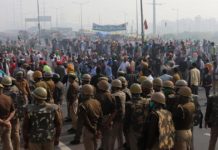
In a country where gender-based violence has been a persistent issue, the brutal rape and murder of a female doctor in India has sparked nationwide outrage. This heinous crime has not only shattered the lives of the victim’s family and friends but has also reignited public anger over the safety of women in the nation. The incident has led to widespread protests, with thousands of people taking to the streets to demand justice and reforms in the judicial and law enforcement systems.
The Incident That Shook the Nation
The tragedy occurred in a major Indian city, where a young female doctor was abducted, raped, and murdered by a group of men. The details of the crime are harrowing, revealing the brutality with which the perpetrators carried out their heinous act. The victim was returning home after a long day at work when she was targeted by the accused, who had meticulously planned their attack. Her body was discovered the following day, leading to a massive public outcry.
Public Outrage and Nationwide Protests
The rape and murder of the doctor have ignited a wave of protests across the country. From metropolitan cities to small towns, people from all walks of life have come together to express their anger and demand justice. The protesters are not only calling for the swift prosecution of the accused but are also demanding comprehensive reforms to ensure that such incidents do not occur again.
One of the main demands of the protesters is the fast-tracking of the judicial process in cases of sexual violence. In many instances, justice is delayed due to the slow pace of trials, leading to prolonged suffering for the victims and their families. The public is also calling for stricter punishments for the perpetrators of such crimes, including the death penalty in cases of rape and murder.
The Role of Social Media in Mobilizing Support
Social media has played a significant role in amplifying the voices of the protesters. Hashtags such as #JusticeForDoctor and #StopRapeCulture have trended on various platforms, with people sharing their stories and expressing solidarity with the victim’s family. The widespread use of social media has helped in mobilizing support for the protests, with people organizing rallies and marches through online platforms.
The incident has also sparked a debate on the role of social media in addressing issues of gender-based violence. While some argue that social media has been instrumental in bringing attention to such issues, others believe that it has also led to the desensitization of the public, with people becoming mere spectators to such crimes.
Government Response and Actions Taken
In response to the widespread protests, the government has announced several measures to address the public’s concerns. The authorities have promised to fast-track the judicial process in this case, with the trial of the accused set to begin within weeks. The government has also announced plans to strengthen laws related to sexual violence, including the introduction of harsher penalties for the perpetrators.
Moreover, the government has assured the public that steps will be taken to improve the safety of women in the country. This includes increasing the number of women police officers, enhancing surveillance in public spaces, and launching awareness campaigns on the issue of gender-based violence.
The Need for Comprehensive Reforms
While the government’s response has been welcomed by some, many believe that more needs to be done to address the root causes of gender-based violence in India. Activists and experts argue that the issue goes beyond the need for stricter laws and faster trials. They emphasize the need for comprehensive reforms in areas such as education, law enforcement, and societal attitudes towards women.
One of the key areas that require attention is the education system. Activists argue that gender sensitivity should be an integral part of the school curriculum, with children being taught from a young age about the importance of respecting women and condemning violence. This, they believe, will help in changing the societal mindset that often leads to the normalization of sexual violence.
Law enforcement is another area that requires urgent reforms. Many victims of sexual violence do not come forward to report their cases due to fear of harassment by the police or the stigma associated with such crimes. There is a need to create a more victim-friendly environment within the police force, with specialized units dealing with cases of sexual violence and providing support to the victims.
The Role of Society in Combating Gender-Based Violence
While legal and governmental reforms are crucial, societal change is equally important in addressing the issue of gender-based violence. The incident involving the doctor has once again highlighted the deep-rooted misogyny that exists in Indian society. Changing societal attitudes towards women is essential in preventing such crimes from occurring in the future.
There is a need for greater awareness and education on issues related to gender equality and women’s rights. Society as a whole needs to come together to condemn acts of sexual violence and support the victims. This includes challenging the stereotypes and cultural norms that perpetuate the subjugation of women.
Moreover, there is a need for greater support for survivors of sexual violence. Victims often face numerous challenges in their quest for justice, including social stigma, victim-blaming, and lack of access to legal and psychological support. It is essential to create a support system that helps survivors rebuild their lives and ensures that they receive the justice they deserve.
A Call for Action
The rape and murder of the doctor have brought to the forefront the urgent need for action to address the issue of gender-based violence in India. The nationwide protests are a testament to the public’s anger and frustration with the current state of affairs. However, it is important to remember that real change can only come through sustained efforts by the government, law enforcement, and society as a whole.
The incident should serve as a wake-up call for the nation to take decisive action to ensure the safety and dignity of women. It is only through comprehensive reforms and a collective change in societal attitudes that we can hope to prevent such tragedies from occurring in the future.


































trezor.io/start